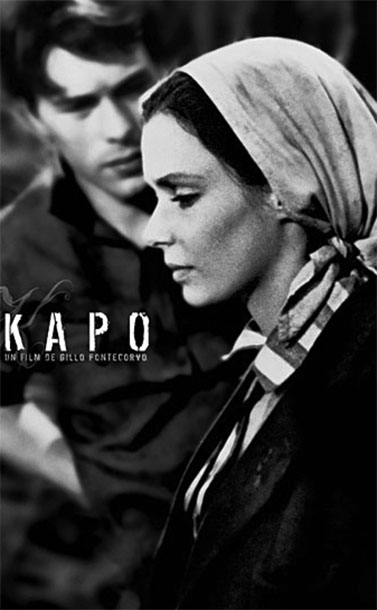Nietzsche’s theory of the gangster movie (1/24/05)
____________
Kapo. [Gillo Pontecorvo, 1959. Written by Pontecorvo and Franco Solinas.]
An Italian neorealist’s retelling of a true story about a prison break at Treblinka: unspoiled young Jewish girl Susan Strasberg (presumably recruited for this part because she had played Anne Frank on Broadway) comes home from her piano lesson one afternoon in Paris to discover the Nazis carting her parents off to the camps; panicking, she breaks away from the neighbors trying to restrain her, chases the truck down, and is carried off herself to a holding pen where she must witness sentence passed by the judges of the Nazi underworld and stand by helplessly as her family is condemned to the ovens. When by a stroke of fortune a prison doctor helps her assume the identity of a dead gentile and she herself is shipped instead to the labor camps, the brute randomness of her own luck only appalls and overwhelms her. She stares into the abyss; it stares back into her; her heart turns to stone. She sells her still sweet young body to the SS, becomes a prison trusty (the kapo of the title), and undergoes a metamorphosis, at once remarkable and abhorrent, from deadeyed beaten prisoner to Daughter of Ilsa, marching with an arrogant Prussian strut at the head of a troop of female slave labor with a riding crop in her hand, barking orders in the language of the master race. Though she harbors no illusions about the character of the Germans or their prospects for ultimate victory, the moral dimension has been rendered meaningless, and she embraces the role of a fellow traveller, to ensure her survival in comfort; until a fresh crop of male prisoners arrive from the ever-advancing Eastern front, she falls despite herself for a handsome Russian lad, and decides to aid him and his comrades in the escape they plan as the Red Army nears and the Germans prepare to machinegun their prisoners and bulldoze them into a mass grave.
This can only end badly. But there is a really magical moment near the denouement, at the very instant when Ms. Strasberg realizes that if the prison break is to succeed, she herself must die, when she stands near the electrified fence, gazing out at the now-unattainable world beyond: the light changes, and the clouds stand out in a suddenly more distant sky, brute existence illuminated by a radiance which is not simply that of the in-itself. — Prince Andrey lies on the hill of Pratzen, fallen with the flagstaff in his hands, gazing at the high gray clouds creeping quietly across an immeasurably lofty sky; between them the blue limitless infinity. — Life in itself is rarely beautiful. But the art of the cinematographer can make it so.
____________The day the highlands stood still (1/14/05)

